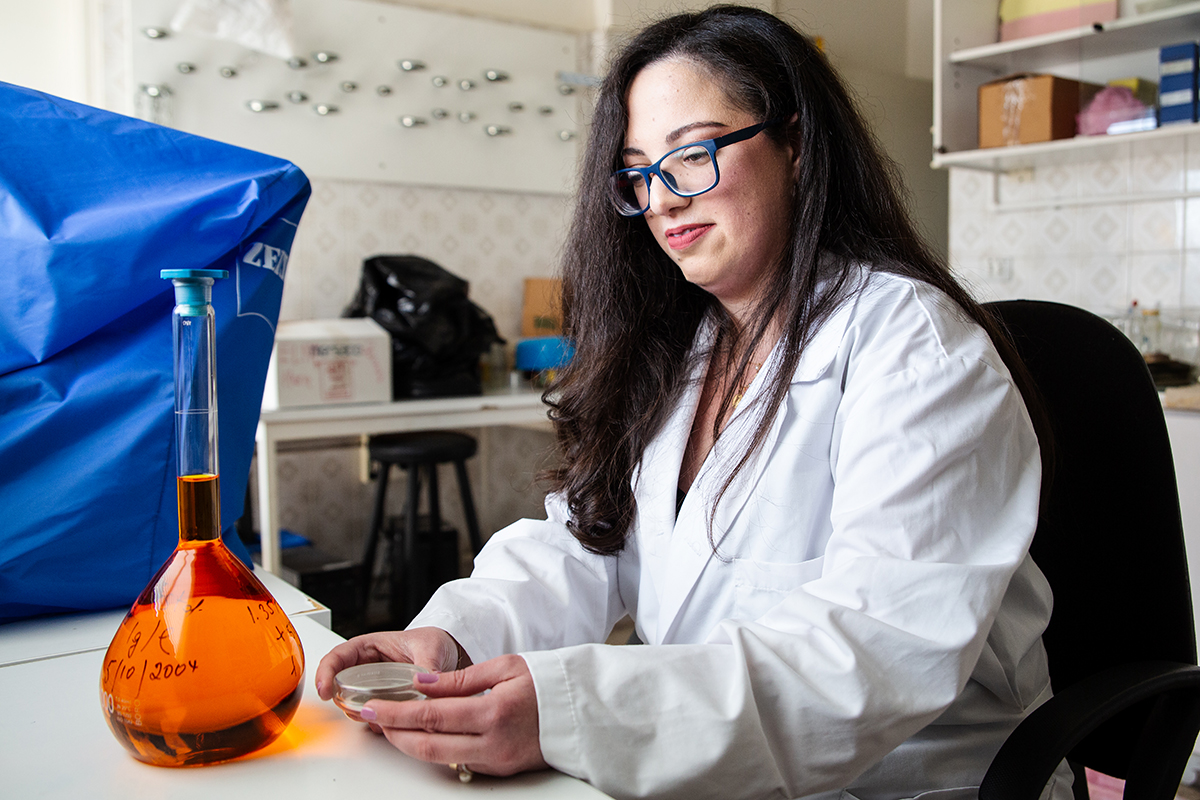Myriam Ghsoub: “Thinking green leads to acting green”
Date:
Myriam Ghsoub, 29, is a research consultant at the National Center for Marine Sciences in Lebanon. She has completed several works on marine research, including assessing the ecological quality of the coastal ecosystem and the evaluation of the marine sediments’ characteristics. A firm believer in science, she seeks to understand the global environmental changes caused by human activities which are threatening the physical, economic, and food security of local communities, as well as resources for global businesses.

Since childhood, Myriam Ghsoub has been fascinated by the sea and marine organisms, mostly by sea turtles and dolphins and she wished to find ways to protect them and preserve marine life. While still completing her master’s degree in Biology and Marine Ecology (she then earned a Ph.D. in Oceanology), she joined the National Center for Marine Sciences, a recognized institute within the Mediterranean network of marine centers.
She says, “at the Center, we consider ourselves to be the family of the sea. As a research consultant, I participate in workshops, training, and field surveys as part of national and international projects, which require sampling, monitoring, lab analysis, mapping, report writing, as well as database inventories.” Ghsoub mostly loves fieldwork as she gets to spend time on board a research vessel. “A while back, we sailed through the Mediterranean Sea along the coast of Lebanon, from the North to the South, from Arida to Naqoura, to report observations of sea life underneath. The highlight of this trip was seeing the Bottlenose dolphins, mainly spotted in Ras Beirut.”
With the aim of providing better knowledge and enabling better protection and governance of the Lebanese coast, Ghsoub took part in mapping biodiversity features, as part of a cooperation between the National Council for Scientific Research (CNRS) and the International Union for Conservation of Nature (IUCN). Her research also included surveying beach marine litter at three public beaches: Okaibeh, Ramlet el Baida, and Saida. The sea (or beach) in Lebanon is a subject of concern. In its 2021 annual report on beach pollution and the bacteriological status of the Lebanese coastline, the CNRS warned that 8 out of 36 beaches are highly polluted, and 4 sites are classified as risky or unsafe. Ghsoub admits that tar and oil spills pose a threat to the marine environment and organisms.
Ghsoub calls for the adoption of appropriate environmental measures to mitigate the environmental challenges. She says, “All of us have a crucial role to play in saving our coasts. An effective response is linked to early detection. Local communities are the main actors in the mitigation of emergency incidents, such as oil spills. Volunteers can be mobilized in cleanup campaigns, tar, for instance, can easily be removed manually from sandy beaches.” Ghsoub gladly notices a recent increase in the number of cleanup campaign initiatives involving all members of the community.
“Change starts with us. We do not have to be decision-makers. Change can begin at home.”
Lebanon’s fish species do not contain a high level of toxic heavy metals and are still edible, but risks exist, according to Ghsoub. “Even if Lebanon’s coast is not as contaminated as we might think, the situation will deteriorate, if we do not act fast. We need to protect our sea life,” she asserted
When Ghsoub completed an innovative study for Lebanon during her Ph.D. research project on the Ibrahim River, she was providing an accurate evaluation of the ecological status of the examined area. The study of the Ibrahim River, in the Jbeil District, originating from 1300 m altitude, and flowing into the sea 25 km to the north of Beirut, concluded that all stations studied at the coastal area facing Ibrahim River were uncontaminated or only slightly contaminated by trace elements. Moreover, the incidence of biological effects of trace elements on biota was rare.
Ghsoub explains that in Lebanon, most of the sediments of marine areas outside ports and industrial locations are not highly polluted by heavy metals, but rather at some specific locations by varying levels of fecal coliforms and fecal streptococci. She says, “we need to implement better plans for wastewater management that will involve both the government and municipalities. As researchers, we can contribute with reports to request immediate actions, but the decision needs to be taken by the authorities. “
Climate action is a topic very close to Ghsoub’s heart and according to her, individual awareness is key. “We need to start with small eco-friendly initiatives. We are all accountable for climate change, which does not only pose a threat to ecosystems and biodiversity, but also to all of us, the humans.” Ghsoub went on to say, “many species living in water or on land might not be able to adapt to global warming and will go extinct. To survive, we, the humans, depend on what nature offers us. Climate change is affecting food security with the loss of livestock and the reduced availability of fisheries. We need to protect ourselves by protecting everything around us.”
She concludes: